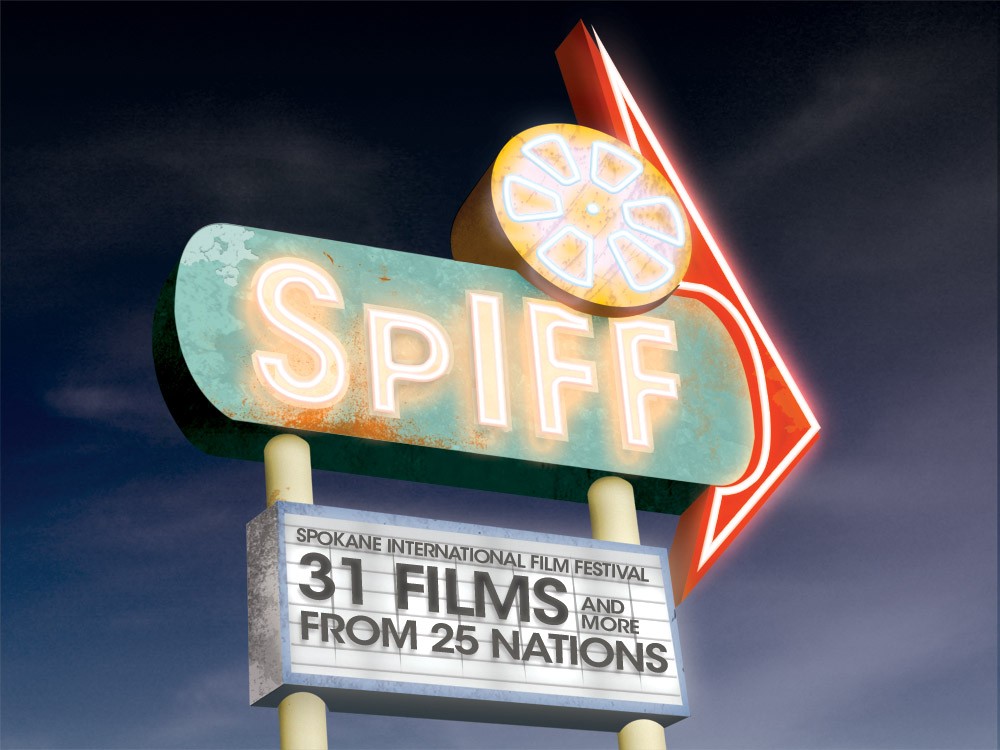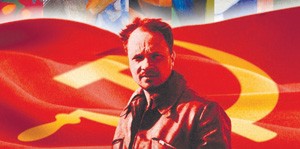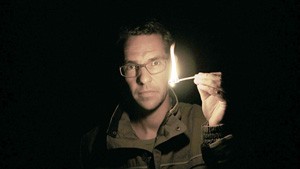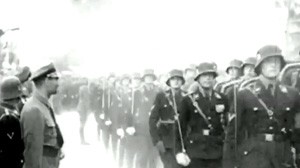Remember that New Year’s resolution you made to watch movies outside your comfort zone? (You don’t remember? Must’ve been drunk. You totally expressed interest in that one documentary.)
Well, just this Saturday, SpIFF will offer documentaries about North Korea, avant-garde Russian art, the Holocaust, and junkyard workers in both China and the United States.
The festival’s opening days also offer a Canadian redneck comedy, a Japanese comedy set at the South Pole, and a German romantic comedy. (Do they even make those?)
You’ll be glad you made that resolution that you don’t remember making. And you can keep it — with 31 feature films (and more) over the next 11 days — at the Spokane International Film Festival.
— MICHAEL BOWEN
Local
48-HOUR FILM FESTIVAL
Magic Lantern | Fri, Feb. 4 | 7 pm
Tomas Guzman of North by Northwest shares all the winners — first shown on New Year’s Eve at First Night Spokane — along with the bonus of two scary movies.
JORDY BYRD
ALAMAR
AMC | Sat, Feb. 12 | noon
MEXICAN DRAMA
This movie will make you want to quit your life, buy a tiny boat, and fish for a living in Mexico. We follow a father and his young son, who’s visiting from Italy where he resides with his mother. The man is a fisherman, and the movie chronicles the seemingly mundane adventures the two have together — swimming, fishing, hanging out in the man’s shack on the sea.
Sound dull? It’s completely the opposite. The documentary-style camera work, natural demeanor of the actors and beautiful scenery will completely envelop viewers. You’ll feel like a silent family member, enjoying the trip and longing to return to your shack by the sea, even though you were never actually there in the first place. (Mexico | 73 mins)
— TIFFANY HARMS
Local
ANIMATED SHOWCASE
AMC | Sat, Feb. 5 | Noon | Magic Lantern | Sun, Feb. 6 | 2 pm
Short, sometimes socially inappropriate cartoons prove once again that cultural criticism is easier digested in Technicolor and silly characters. The collection of 11 animated shorts — six are competing for an Academy Award — will be shown twice.
The retro-throwback (and now Oscar-nominated) “Let’s Pollute” takes a satirical spin on capitalist consumerism. In this society, garbage makes the world go round and contributes to a healthy economy. The premise is obvious and delivers a message that’s been crammed down our throats before, but these exaggerated cut-out paper characters are likable, albeit a little scary. (USA | 7 mins)
“The Lost Thing” presents a modern day fable from acclaimed illustrator Shuan Tan (also honored with an Oscar nomination this year). While walking through the city — now an industrial wasteland — an inquisitive boy finds a creature. The gigantic alien-like octopus has tentacles and pinchers, but no home. So the boy sets off to find recognition and acceptance for the creature in a world that refuses to acknowledge his strange existence. (Australia | 15 mins)
Beauty is a fickle monster, and “The Wonder Hospital” highlights the dark self-deprecation that some people (and puppets) put themselves through. This surreal 3D puppet animation follows one little girl’s quest for superficial beauty. Inside this bizarre hospital, modification of physical appearance is not what you would expect, and the girl becomes lost on a path of illusion — constantly seeking unattainable beauty. (South Korea | 12 mins)
The French animation “Le Silence Sous L’Ecorce” is like the faint remembrance of a dream — bright white, innocent and beautiful, yet the shadows and purpose are distorted. In the depths of a lifeless forest, two curious creatures discover the beauty of snow. Their fascination is childlike as they run, play and twirl beneath the snowflakes. And despite the cold nature and vastness of this forest, the atmosphere is safe, intimate and confined. Dreamlike. (France |11 mins)
“The Cow Who Wanted to be a Hamburger” presents the question, Can a mother’s love overcome the power of advertising? This children’s fable tells the story of a baby cow who, because of the fast-food billboard in his family’s pasture, wants to become a hamburger. (USA | 7 mins)
In the mid-‘90s, two avant-garde composers recorded an improvised album. Michel Gange visualized the work in animated form through “Sensology.” In this animation, white objects (lines, dots, circles) dance, slither, explode and zig-zag across a black screen. But the objects are only set into motion by the sporadic notes and seemingly random sounds. It’s synesthesia on a moving screen. (USA | 7 mins)
— JORDY BYRD
Local
THE BIG SAYONARA
Magic Lantern | Thurs, Feb. 10 | 7:30 pm
SHORTS
A handful of commercial video and music producers make a film based upon a series of Sterling Silver Bank commercials ... sounds like the beginning of a bad joke (or at least a bad movie), right? Well, wrong.
“The Big Sayonara” is a compilation of local commercial talent, but there aren’t any jingles or Vaseline smiles here. The entirely improvisational comedy features a Wall Street employee who must make a new life for himself after losing his job during the economic collapse.
The short, which stars and was co-written by Chris White, was produced by Spokane’s Hamilton Studios.
“The real reason we did this film was just to do something that wasn’t commercial,” White says. “It was purely for fun.”
The film is the culmination of a series of six shorts (some local, some not) chosen by Don Hamilton of Hamilton Studios. The series includes “Two Friendly Ghosts,” about the meeting of a murdered man and his victim; “The Fall Line,” about an Iraq War veteran who finds healing and triumph on a Paralympics ski team; and “The Killing of Mary Surratt,” about the aftermath of the Lincoln assassination and the first woman executed by the U.S. government.
“There’s a huge short-film-fest community,” White says. “They’re great to watch, and the best part about festivals like SpIFF is you get to talk with filmmakers from across the country. You can talk about the plans and thought process that went into the film or what bank they had to rob to get it made.”
— JORDY BYRD
CARANCHO
Magic Lantern | Thurs, Feb. 8 | 7 pm
ARGENTINE CRIME DRAMA
An exploitative lawyer, a sexy doctor and lots of money to be made in Buenos Aires, where 8,000 people die annually in car crashes. What could go wrong? That’s the starting point for this dark thriller. (Argentina | 107 mins)
— JACOB H. FRIES
CHEF OF SOUTH POLAR
AMC | Fri, Feb. 4 | 8:30 pm
JAPANESE COMEDY
When the world seems cold, nothing warms us up like a plate of food made with passion and love.
Unfortunately, to figure that out, Chef Jun Nishimura (Masato Sakai) has to travel to the bottom of the Earth.
Both comical and heartwarming, this film by director/screenwriter Shuichi Okita follows a research team to the Antarctic. While the scientists confront the bitter cold, Chef Nishimura prepares delicacies that end up being the warmest part of the scientists’ day.
Facing extreme loneliness in extreme conditions? A cup of miso soup might just help. (Japan | 125 mins)
— TAMMY MARSHALL
CITY OF LIFE
Magic Lantern | Mon, Feb. 7 | 7 pm
MIDDLE EASTERN DRAMA
Remember Crash? Well, take that movie and swap in Dubai for Los Angeles. It’s a movie that centers on a handful of characters who literally crash into each other in a car wreck and who wouldn’t normally interact. It’s a great concept, but one that we already saw in the Best Picture of 2004. But the new setting — the United Arab Emirates — does provide an interesting new backdrop for the idea: layering stories of wealth, poverty and lost dreams together. If nothing else, City of Life is slick in a way that The Fast and the Furious was — full of shiny coupes and glitzy parties. But to be honest, I was kind of rolling my eyes during the motorcycle pop-a-wheelie scene. (United Arab Emirates | 105 mins)
— LEAH SOTTILE
THE COLORS OF THE MOUNTAIN
AMC | Sat, Feb. 12 | 5:30 pm
COLOMBIAN POLITICAL DRAMA
Far from the fights of politics and war, you’re enjoying country life in idyllic, rolling hills, but you soon learn that no one — not even in an isolated village — can completely avoid trouble. That’s the premise of The Colors of the Mountain, set in rural Colombia, where guerilla fighters bring chaos, fear and landmines to the countryside.
At the center of the film is a 9-year-old boy, Manuel, who loses his soccer ball in a minefield and whose parents, like everyone else in the village, must decide whether to stay in the only life they’ve known — or flee. In the end, the film is heart-wrenching and tense and beautiful and terribly sad. (Panama, Colombia | 99 mins)
— JACOB H. FRIES
DEMOLITION
Magic Lantern | Sat, Feb. 5 | 4 pm
CHINESE LABOR DOC
J.P. Sniadecki, director of the unvarnished and raw Foreign Parts (see p. xx) treads similar ground in Chai-qian (“Demolition”) a subtitled documentary about a large industrial site in Chengdu, China. Here, poverty and wealth, change and stagnation intermingle side by side.
Sniadecki, who’s pursuing his doctorate in anthropology at Harvard (and who is scheduled to attend screenings here) specializes in using the long take, letting the camera roll and roll and roll. Unhurried by the demands of modern attention spans, he’s trying to capture the texture of a demolition site. (USA/China | 62 mins)
— DANIEL WALTERS
THE DESERT OF FORBIDDEN ART
Magic Lantern | Sat, Feb. 5 | 3:30 pm
RUSSIAN ART DOC
For decades, a huge cache containing some of the most vibrant and beautiful paintings in 20th-century modern art languished in a museum located in the southern desert of the former Soviet Union — unseen and almost entirely forgotten by the rest of the world. The Desert of Forbidden Art peels back the last remnants of Joseph Stalin’s Iron Curtain to reveal an extraordinary collection of work by Russia’s avant-garde, a massive collection of some 44,000 lost works that rival, in technique and relevance, those of Picasso, Kandinsky, Gauguin, Matisse and Van Gogh.
Documentary filmmakers Amanda Pope and Tchavdar Georgiev tell the story of museum curator Igor Savitsky, who tirelessly traveled the breadth of the Soviet Union to rescue and eventually display works deemed degenerate and anti-Soviet by party leaders. (Because they had rejected the prevailing state-approved art and remained true to their own, very personal, visions, many of the artists had been jailed.)
Savitsky’s singular obsession in establishing a “museum of the artists’ souls” has preserved the beauty of artifacts created during a time of indifference and persecution. (Uzbekistan/Russia/USA | 80 mins)
— MIKE CORRIGAN
AN ECOLOGY OF MIND
Magic Lantern | Sat, Feb. 12 | 11:30 am
CANADIAN BIO DOC
Gregory Bateson was a clever chap. Born in England, he moved to California in the 1930s and worked as an anthropologist, systems theorist and philosopher while significantly advancing knowledge in his chosen fields. In An Ecology of Mind, his daughter stitches together a portrait of this brilliant man from old photographs, lectures, interviews and Bateson’s own films shot in Bali and New Guinea. Director Nora Bateson is scheduled to attend. (USA | 60 mins)
— AARON MAHAN
Local
FAVES SHORTS
Magic Lantern | Sat, Feb. 12 | 3:15 pm
Anything is possible. Comic books transport boys into World War II bomber missions in “Mad Dog and the Flyboy.” Men fantasize about becoming singers to escape from dreary reality in “The Singer,” and men and women float about space, surrounded by memories but unable to speak to one another in “The Tennessee Waltz.”
SpiFF’s program of seven shorts (some local, some not) was built around local director Adam Harum’s film “Disintegration,” which was the 2010 Film and Video Enthusiasts of Spokane (FAVES) Reel Spokane winner. The mockumentary (think The Office) follows a tame but disgruntled employee who’s accused of fraud and fights for his innocence. Despite his best efforts, his life begins to disintegrate around him.
This wacky misadventure was Harum’s senior thesis film project at Eastern Washington University. Harum says his shorts are a difficult genre to create, but nonetheless rewarding.
“The best part about short films is the emotional punch they can have,” he says. “I don’t know why, but people are less willing to watch a 10-minute movie than a two-hour piece of crap. They don’t realize that shorts can reveal an entire range of emotions. They only have so much time to tell a story, so every second counts. These films are very concentrated and very intense.”
Of course, getting to the heart of things — and editing down four hours of film into 11 pointed minutes — is the hard part. “You have to embrace the fact that what you keep in the film is ultimately the best part,” Harum says. “You have to take out your baby, because usually what you like the most is going to be edited away.”
— JORDY BYRD
FILMMAKER FORUM 1
Magic Lantern | Sat, Feb. 5 | 1 pm
SFCC film instructor and SpIFF senior progammer Irv Broughton hosts a discussion with documentarians (The Rescuers, The Desert of Forbidden Art, Foreign Parts, Demolition), a Pixar animator (“Let’s Pollute”), a Canadian director (Tucker & Dale vs. Evil) and others.
FILMMAKER FORUM 2
Magic Lantern | Sat, Feb. 12 | 1 pm
Marvin Smith, a film professor at EWU, will moderate a discussion among local and regional directors (The Big Sayonara, “Disintegration,” Lady Lily, An Ecology of Mind and Two Indians Talking).
FOREIGN PARTS
Magic Lantern | Sat, Feb. 5 | 11:30 am
BLUE-COLLAR IMMIGRANT DOC
Many documentaries feel like visual political editorials, while others feel like tightly-honed magazine articles. But Foreign Parts feels entirely unique, like the raw notes from an extensive New York Times feature that hasn’t yet been written.
Foreign Parts is about New York enclave of immigrant laborers working in junkyards doomed to be torn down for a new development in Queens. There’s no explicit point or focus more than mere “about.”
This is a documentary purely about setting — never narrative or character or theme. In fact, it barely feels ordered or edited at all.
The camera languishes on long shots of slums, litter, standing water and grime. It subtitles the Hebrew and Spanish we hear from the workers — but only sporadically. There’s no voiceover narration or ironic scene juxtapositions. Foreign Parts is farthest away you could ever get from Michael Moore or Morgan Spurlock’s slick smirks.
Foreign Parts unpolished rawness, however, is its strength. It’s immersive. You feel the oil underneath your fingernails and puddles of dirty water lapping at your ankle. You feel there. Not there to learn something. There to just be. (USA | 81 mins)
— DANIEL WALTERS
IN THE SHADOWS
AMC | Fri, Feb. 4 | 5:30 pm
GERMAN CRIME DRAMA
Trojan is a badass. Even more so if you pronounce it in German: Troy-ahn.
That’s better. And don’t forget it, because Trojan is the coolest, smartest and best-looking dude in this entire movie.
Fresh out of prison, Trojan is unmoved. Stuck between a corrupt cop and some scheming thieves, Trojan’s got his wits about him. Faced with an ex-lover and an enticing heist, Trojan keeps his cool.
And though In the Shadows is essentially a heist movie with its share of stupid crooks and implements of violence, it’s got a lot of quiet in it. Meyer, the cop, tails people for many long moments, his soundtrack just the wind in the trees or tires on the road. A scene of Trojan loading his clip with bullets takes its time. Bullet after bullet after bullet.
Through this noir-ish movie, you’ll see violence, some of it gruesome. And you’ll see many guns flashed about. But count the many times you hear one fire. You may be surprised. (Germany | 85 mins)
— NICHOLAS DESHAIS
INTO ETERNITY
Magic Lantern | Sat., Feb. 12 | 6 pm (Also showing Sun, Feb. 13, at 2 pm)
FINNISH NUKE DOC
This Danish documentary takes you on an eerie, disturbing journey deep under the frozen forests of Finland.
The Finns are tunneling hundreds of meters underground, creating a vast subterranean city they intend to fill with nuclear waste … and then forget about.
It’s called Onkalo, the hiding place. The world has an estimated 250,000 pounds of spent, high-level radioactive waste that nobody can safely “fix.” Onkalo is meant to store Finland’s fraction — store it, safely, for 100,000 years.
Just in the last 100 years, one scientist notes, there have been countless earthquakes, tsunamis, two world wars and the Chernobyl disaster. In the last 40,000, some humans, Neanderthals, have gone extinct. In 100,000 years, how can we even know who will be here? How do we communicate to them the danger of poking around Onkalo? One side wants to puzzle out effective warnings. Another side says bury the entrance and walk away.
At turning points, the film fades to black and fssss! … Madsen strikes a match deep inside the Earth to deliver a parable about eternal fires.
His slow-rolling dolly shots and the rare access to nuke facilities and Onkalo create a creepy, X-Files vibe as we think about an incomprehensible span of time. (Denmark | 75 mins)
— KEVIN TAYLOR
KAWASAKI’S ROSE
AMC | Sun, Feb. 13 | noon
CZECH CRIME DRAMA
Czechoslovakian director Jan Hrebejk’s probing socio-political drama of love and betrayal is an absorbing treatise on personal honor and the compromises we all make for the sake of lovers, family and country. Here, a famous Czech psychiatrist, seen as a hero in his community for opposing the former Communist regime, is unexpectedly exposed as something else entirely: a sympathizer of the Party who was instrumental in the forced exile of a family friend.
The title refers to one of the most difficult figures to create in origami, which stands as the film’s metaphor for intricate personal relationships. (Czech Republic | 100 mins)
— MIKE CORRIGAN
THE KIDS GROW UP
AMC | Sun, Feb. 13 | 3 pm
AMERICAN PARENTING DOC
Here is a list of people who will probably cry all the way through The Kids Grow Up: mothers, fathers, pregnant women, grandparents, menopausal 50-somethings, women with PMS, college-bound teenagers, university administrators, or anyone feeling nostalgic, along with anyone who might have sensitive feelings, who is homesick or is feeling even the slightest bit sentimental. Or anyone, really, with a vagina. If you identify with any of those groups, The Kids Grow Up will jerk your tear ducts wide open.
When documentarian Doug Block’s only daughter, Lucy, was a toddler, he started filming her life. He didn’t stop until she went to college. As a child, Lucy loved the cameras. But as a teenager, she hated them.
Though you barely see Block’s face in the film, you see his love for Lucy in every frame. When she leaves for college, it breaks his heart: He’s a dead man walking. Watching The Kids Grow Up shows you just how vacant someone can feel when their nest is empty. (USA | 90 mins)
— LEAH SOTTILE
KINGS OF PASTRY
Magic Lantern | Sun, Feb. 6 | 11:30 am (Also showing Fri, Feb. 11, at 5 pm)
FOOD DOC
When it comes to food-based reality programming, I’m like a teenage boy with a copy of Hustler. I … can’t… look… away. And Kings of Pastry looks to be the ultimate food porn. Every year, the creme de la creme of French pastry chefs compete for the ultimate honor: the Meilleurs Ouvriers de France — essentially, the best craftsman among pastry chefs. It’s an honor given by President Nicolas Sarkozy — one earned over the course of three tear-filled, tension-iced, sugar-coated days. Someone called it “the culinary The Hurt Locker.” Hyperbole? Maybe. But I’ll still be drooling in the front row. (Netherlands,USA, UK, France | 87 mins)
— LEAH SOTTILE
KINSHASA SYMPHONY
Magic Lantern | Fri, Feb. 4 | 5 pm (Also showing Sat, Feb. 5, at 6 pm)
MUSIC DOC AFRICA
Kinshasa Symphony depicts, movingly, the sacrifices that people are willing to make just to ennoble their lives with music. In a city of rusted-out cars bouncing over potholes, of hand-lettered signs on sagging storefronts, and of apartments that make your garage look like a hotel suite, the world’s only all-black orchestra and chorus is determined to perform Beethoven’s Ninth Symphony. But members of the Orchestre Symphonique Kimbanguiste have to hand-build musical instruments whose names they scarcely know, and one of the violists is always leaving rehearsal to keep the generator running.
Yet after all the sweaty, short-tempered rehearsals and glares from dubious onlookers, when the big concert finally arrives, the crowd is huge — and Kinshasa’s amateur musicians. unexpectedly, turn out to have been practicing more than just the Beethoven.
When privileged Europeans and North Americans undergo privations like these just for an opportunity to reproduce Congolese music on Congolese instruments, then we will have achieved the unity of humankind that Beethoven’s Ninth envisions. (The Spokane Symphony’s Eckart Preu will introduce the Friday screening.) (Germany/Congo | 95 mins)
— MICHAEL BOWEN
Local
LADY LILY: (ADVENTURES IN GOD’S COUNTRY)
Magic Lantern | Fri, Feb. 11 | 7:30 pm
It’s a sexy mind trip. The premise: two best friends spend the summer at a cabin, and a local man wedges between them. The backdrop: panoramic views of Priest Lake. The soundtrack: unique indie scores. Mind trip: the conclusion’s unexpected.
Director Danielle Barbieri, a Spokane native, tells The Inlander about her first feature-length film.
INLANDER: What was your inspiration for the movie?
BARBIERI: I started writing the script while in film school at Boston University, and I was coming home for vacations and going back up to Priest Lake. I told myself, ‘I need to make a film up there. It’s such a perfect setting.’ But at the time, I was watching a lot of David Lynch films and was getting into strange things.
How was the filming process?
Well, the original script was only 20 to 25 pages long. We originally went up there just to shoot a trailer, but the community was so helpful — and everything kind of came into place — so we ended up doing the entire shoot. A lot of it was based on improvisation. We had a lot of fun in the editing process discovering where the story was.
Are you worried your characters portray any stereotypes? Like the redneck father or rich girls?
I kinda wanted those stereotypes to be prevalent and then have them turn on themselves. It’s not your normal, two-hot-chicks-go-to-the-lake kind of movie. I wanted to play into that and trick the audience into believing that’s what they’re seeing.
Will you give away any hints about the plot twist?
There are hints and clues you might not catch the first time around. So I hope people start talking about the film, about what’s reality and what’s not, what’s real and what’s tangible. (USA | 61 mins)
— JORDY BYRD
LITTLE SPARROWS
AMC | Sat, Feb. 12 | 2:30 pm
AUSSIE GRIEF DRAMA
“It’s come back,” Susan tells her husband. She’s talking about her cancer. The quiet way she announces the news reflects a theme of this Australian drama: how we struggle to communicate openly and directly about our deepest emotions.
Susan’s three daughters — her “little sparrows” — grieve for their mother in distinct ways. The narrative is broken up into their individual journeys, leading up to the family Christmas gathering, which Susan is determined to have without the cancer ruining it. The film jumps around so much that a theme emerges: Just as the characters don’t express themselves directly, the movie itself is going to communicate in fits and starts.
The mother, predictably, gains in honesty as she approaches death. What’s not so predictable is how the film’s subdued color scheme changes in the final scene, with vibrant colors symbolizing the wisdom that’s been gained. The daughters may have lost their way, but Little Sparrows expresses hope that they’ll find renewed strength. (Australia | 88 mins)
— CHELSEA FINGER
THE MATCHMAKER
AMC | Sat, Feb. 12 | 8:30 pm
ISRAELI TEEN DRAMA
Yankele Bride (Adir Miller) works to repair some of the damage inflicted on the Jews during the Holocaust.
His solution? During the late ‘60s, he arranges marriages, mostly for couples now living in Israel but who once were confined in the Nazis’ death camps.
In this fictional tale, much of Bride’s good work is shown through the eyes of teenager Arik Burstein (Tuval Shafir). Bride hires Arik to spy on his clients, making sure they’re looking for love and not just hanky-panky.
Sadly, Bride’s co-matchmaker and love interest, Clara Epstein (Maya Dagan), can’t love him in return due to the abuses she suffered in the Nazi camps.
Acclaimed Israeli director Avi Nesher has created a small but significant post-Holocaust love story that examines humanity’s worst side along with our capacity for seeking out and finding love.
Both sad and funny, The Matchmaker is a cute love story and a tragic tale about the consequences of inhuman abuse. (Israel | 112 mins)
— TAMMY MARSHALL
MY WORD, MY LIES … MY LOVES
AMC | Thurs, Feb. 3 | 7 pm
GERMAN ROM COM
David is just a lowly waiter who’s kinda dorky. Well “kinda” dorky is subjective. As this is a German film, David’s Deutschland dorkiness will hit your American sensibilities in such a way that makes him appear unfathomably awkward. Even his mouth is strange. Germans.
Just as he’s becoming unbearably pathetic, David runs across an unpublished novel manuscript. Well this is just super-fantastisch, as he’s trying to seduce a hot, pretentious literature major. After slapping his name on the manuscript, he gives it to her to read. Naturally, she falls in love with it and him. She secretly sends the novel off to a publisher, Suddenly David becomes Germany’s most famous author. There’s just one tiny complication: The man who wrote the novel comes forward. (Germany | 104 mins)
— TIFFANY HARMS
POETRY
AMC | Thurs, Feb. 10 | 7 pm
KOREAN DEMENTIA DRAMA
Director Lee Chang-dong’s sensitive, deeply moving portrait of an elderly Korean woman’s struggle with writer’s block and dementia was awarded the prize for Best Screenplay at the 2010 Cannes Film Festival.
Mia lives in the city with her grandson and works as a caretaker for an infirm elderly gentleman. Her quiet, uneventful life is interrupted by three events: a local girl’s suicide, a diagnosis of early-stage Alzheimer’s, and her introduction to the world of poetry at a local community center. Her poetry instructor’s commandment to stop and see the world as it is leads to a journey of self-discovery and a quest for beauty.
Jeong-Hie Jun is radiant, imbuing Mia with humanity and melancholy. Despite being repeatedly ignored and disrespected by her grandson and generally overlooked by the rest of her community, Mia finds solace in her newfound appreciation for the world. Seeing both ugliness and beauty with new eyes, she struggles against both mediocrity and time. As a result of her illness, her ability to use language effectively is slowly trickling away. (Korea | 139 mins)
— MIKE CORRIGAN
QUEEN TO PLAY
AMC | Fri, Feb. 11 | 8:30 pm
FRENCH DRAMEDY
Study the sad, beautiful face of Sandrine Bonnaire: the angular jaw, the dark eyebrows over even darker eyes, the habitual downcast look that brightens when some small triumph activates a smile.
Grow accustomed to Bonnaire: She’s in nearly every scene of director Caroline Bottaro’s film about a cleaning lady who becomes fixated on learning to play chess. Is it romance? Self-assertion? Breaking through the barriers of social class? Whatever her motive, she’s willing to neglect her marriage, friendships and job just to learn more about people’s passion for chess.
Bonnaire cleans house for a reclusive professor (Kevin Kline) who reluctantly takes her on as his protégé. Almost without words, scarcely ever touching, they enact the thrust and parry and counterthrust of chess, the quiet scheming to push your partner into risks she’s never taken before, the tense build-up before the penetration of defenses and sweet release of checkmate. (Anybody need a cigarette?)
As bonuses, you get a mysterious, sensual cameo by Jennifer Beals; Kline speaking in French; and as backdrop, the plunging cliffs and seascapes of Corsica. (France | 97 mins)
— MICHAEL BOWEN
THE RED CHAPEL
AMC | Sat, Feb. 5 | 5:30 pm
KOREAN COMEDY DOC
How do you expose an evil regime? Do you shout slogans and shake your tiny fist from far away? Danish filmmaker Mads Brugger had a different idea: Let’s form a comedy troupe and seek an invitation to put on a show for the Dear Leader, dictator Kim Jong Il.
Inexplicably, North Korea’s paranoid and secretive regime welcomed Brugger and two Danish-Korean comedians, Jacob Nossell and Simon Jul.
The documentary plunges viewers down a rabbit hole into a land of fear, weirdness and deception. The Danes are every bit as bad: They lie to their hosts at every opportunity, making fun of North Korea’s Stalin-esque leaders without their even being aware.
Later, the comedians sing a Danish hippie song; the North Korean officials appear deeply moved by the lyrics and applaud heartily.
The starvation of North Korean citizens is never explicitly exposed, but the effects of living in such a total dictatorship is stunningly on display.
Last year at Sundance, The Red Chapel won for best foreign documentary. (Denmark | 88 mins)
— KEVIN TAYLOR
THE RESCUERS
AMC | Sat, Feb. 5 | 8:30 pm (Also showing Sun, Feb. 6, at 7 pm at Magic Lantern)
GENOCIDE DOC
The Rescuers follows a present-day British historian and Rwandan anti-genocide activist as they travel to European sites where, during the Holocaust, non-Jewish diplomats broke the rules so that refugees from the Gestapo might live.
We hear, for example, about the American vice-consul and the Quaker activist who helped Jews who had made it as far as Marseilles to escape over the Pyrenees into neutral Spain. Dutch and Japanese envoys helped Polish Jews who had trudged into Lithuania by cooking up a scheme to grant them visas to the Dutch island of Curacao.
The Rescuers promises an extra layer of perspective by having Stephanie Nyombayire and Sir Martin Gilbert visit the many places where heroes resisted sadistic genocidal criminals. But the questions that the film raises — “Why do some people act altruistically, even in the face of great personal danger?” and “How can diplomats act differently in the future, so as to avoid the worst effects of genocide?” — are never really answered. One present-day Polish diplomat, at least, takes up the latter question. He advocates taking genocidal threats seriously from the outset and insists on concerted efforts by international diplomats, without any hiding behind the dodge of being reluctant to meddle in a sovereign nation’s internal affairs.
Director Michael King’s documentary features several affecting sequences: Gilbert explaining the Final Solution in the very room (at Wannsee Villa) where the decision was made. Gilbert — a relative of Holocaust victims — tearing up at a railroad station much like the one where his family members were packed onto death trains. Memorial sculptures in Marseilles, Budapest and Kigali delivering gut-punches — decades later, approximating the genocidal nightmare. An elderly survivor smiling for the camera with his 30 grandchildren — lives that never would have existed without some bureaucrat’s remarkable bravery.
The Rescuers often feels, however, like genocide tourism: computer graphics, staged conversations, camera tricks and swelling strings all emphasize our two hosts’ 35-day rail journey instead of placing the focus on the historical heroes of the Holocaust. (USA | 99 mins)
INLANDER: For such a far-flung enterprise, what were the logistical hassles?
MICHAEL KING: The biggest hassle was moving 30 people by train to
16 countries and three continents. Can you imagine moving 30 boxes of
film equipment onto trains, planes, and boats in Venice? All equipment
needed to clear customs in a post-9/11 world.
Other than Raoul Wallenberg, I had never heard of any of the
“righteous diplomats.” Was that the prime motivation for you — to spread
the word about heroes who would otherwise mostly be forgotten?
Most definitely. These non-Jewish diplomats risked their lives, families, and careers and went against their governments to save thousands of human beings. They didn’t come back home to a marching band and parade! I kept asking myself whether I would have done that or whether I know anyone who would have done that.
Are the visual
segues (the contemporary train blending into an Auschwitz train, for
example) part of the documentary maker’s art, trying to persuade viewers
that what went on then has relevance today?
Absolutely. The aesthetic of the film — with Sir Martin and Stephanie; the past and present stories of the Holocaust, Rwanda and Darfur; and the visual representation — shapes, colors and paints a world where crimes against humanity still live.
But isn’t your film is too slick? It makes an ugly and horrendous topic seem like an armchair travelogue, a guided Atrocity Tour through Europe.
Amid the present-day beautiful landscapes on the train, Sir Martin and Stephanie seek the stories of these courageous and heroic diplomats who saved lives. However, the film transports the viewers to the atrocities of the Holocaust without losing focus on what the story is about: the “mystery of goodness” during the darkest time in the 20th century. The train’s journey represents a duality of freedom and death.
The Rescuers has struck a chord with people of all ages and walks of life. I wanted this film to achieve something unique: adding an additional approach to teaching about the lessons of the Holocaust through the stories of these fortunate survivors and the diplomats. The educational program we want to build will help ensure that teachers are able to make use of this work, making it accessible to students across the country and around world. And this is precisely the approach needed to stimulate thoughtful discussions among diplomats in training.
— MICHAEL BOWEN
R U THERE
AMC | Fri, Feb. 11 | 5:30 pm
DUTCH/THAI VIDEOGAMING
We’ve had pen pal romance, speed dating, and online dating romance movies. Yet that new breed of romance — love via World of Warcraft — has scarcely been touched. Until now. A professional video gamer, suffering from an injury, meets an intriguing Taiwanese masseuse. Their courtship, however, takes place almost entirely via the online video game Second Life. This is what the Avatar romance would look like with the headset mics and QWERTY keyboards of today. (Netherlands/Thailand | 83 mins)
— DANIEL WALTERS
SASHA
AMC | Sun, Feb. 6 | noon
GAY TEEN DRAMA
Sasha is a child of immigrants living in Germany and a talented pianist. He’s also gay. Problem is, he hasn’t come out yet — and it’s not going to be easy discussing the matter with his best friend Jiao, a girl for whom he clearly has a lot of affection.
Sasha has a big piano audition coming up. Even worse, Sasha’s in love with the man who’s been teaching him how to play — and the piano teacher announces that he is moving out of town.
The film starts off well, acquainting us with Sasha’s family — a father with a temper who respects masculine men and a mother who avoids conflict by acting as the family mediator.
When Sasha first comes out to Jiao, however, the film turns into melodrama and the soundtrack pulls out all the violins. While scenes with Sasha’s parents are often well acted, believable and tender, they’re overshadowed by all the overwrought emotions and a climax that comes out of nowhere. (Germany | 102 mins)
— CHELSEA FINGER
A SOMEWHAT GENTLE MAN
Magic Lantern | Wed, Feb. 9 | 7 pm
NORWEGIAN DRAMA
There’s some sex in Norway, to be warned. No foreplay, and it’s not really “sexy,” but it’s there. And there’s violence and cheap cups of coffee and — yes — some love and laughs.
Stellan Skarsgard — most recognizable as the mean math professor in Good Will Hunting — is Ulrik, a man fresh off a 12-year stint in the pen who reemerges to normal life, only to find that life doesn’t feel very normal. His old gang has a “job” for him, his ex isn’t really happy to see him, his son has told everyone his father is dead, and his son’s fiancée doesn’t want him around because “her family doesn’t do stuff like that. They’re more into nurseries and stuff.”
Ulrik’s gentle nature goes a long way — he has a ponytail, after all — but sometimes he just wants to be left alone so he can eat because, you know, it might get cold. (Norway | 105 mins)
— NICHOLAS DESHAIS
TE EXTRAÑO (I MISS YOU)
AMC | Sat, Feb. 5 | 2:30 pm
ARGENTINE POLITICS
Being 15 years old can be difficult for anyone, but it’s especially hard for Javier, who is coming of age in late-’70s Argentina, at the beginning of a military coup that will eventually “disappear” 30,000 dissidents and leftist agitators. One of those, we find, will be Javier’s beloved older brother, Adrian, who returns from army duty and quickly falls in with a band of young and overly optimistic revolutionaries. One night, Adrian — who is already under government suspicion — heads to a meeting that he suspects may be a trap. He never returns. Javier’s adoring parents quickly spirit him away to his uncle’s house in Mexico, where he reels from his brother’s selfish and mysterious disappearance while wrestling with his own lack of revolutionary zeal. (Argentina/Mexico | 106 mins)
— JOEL SMITH
THOMAS MAO
Magic Lantern | Sun, Feb. 13 | 4 pm
CHINESE ABSURDIST DRAMEDY
The grasslands of Inner Mongolia are stunning. That’s helpful, because this film has a few perplexing moments; it’s nice to give your eyes something to admire while your brain un-pretzels.
In the first part of the film, Thomas the English-speaking tourist visits Mao’s rustic lakeside home to do some sketching. The backwoods host and the tactless guest have nothing in common. Cue the East-meets-West hilarity, right?
Not quite. First, there’s a shared afternoon dream featuring a floaty sword-fight dance (wuxia pian, technically). Then come the aliens with the glow-sticks. Shortly after that, we’re somewhere totally different — an artist’s chic studio space.
The characters have also changed: They aren’t characters anymore. They’re themselves. Mao is Mao Yan, a classically trained Chinese oil painter. And Thomas is Thomas Rohdewald, director of the Shanghai Expo’s Luxembourg Pavilion and model for more than 100 of Mao’s paintings.
In real life, the two have been collaborating for more than a decade, and their onscreen conversation (in Chinese) flows like they’re old friends — even with an alien urinating in the room.
Those adept at finding meaning and symbols and metaphors will have plenty to work with. For everyone else, Thomas Mao is a lovely glimpse at what art films in China look like today. (China | 77 mins)
— AARON MAHAN
TUCKER & DALE VS. EVIL
Magic Lantern | Fri, Feb. 4 | 9:30 and 11:30 pm (Also showing Sat, Feb 5 at 9 pm)
CANADIAN COMEDY
Way to go, Texas Chainsaw Massacre. You’ve made hicks terrifying. But Dale and Tucker aren’t those kind of hicks — think Jeff Foxworthy, only stupider. (If that’s possible.) Anyway, the duo encounter some college kids (a few with hot lady parts) in the wilderness and accidentally terrify them. And kidnap one. Accidentally, people. Hilarious, horrifying massacre ensues! (Canada | 89 mins)
— TIFFANY HARMS
TWO INDIANS TALKING
Magic Lantern | Fri, Feb. 11 | 9 pm (Also showing Sat, Feb. 12, at 8 pm)
NATIVE DOC
Truth in advertising may be dead, but not when it comes to this film. Two Indians Talking is quite literally two Indians talking … and talking, and talking — mostly about identity, love, women, culture and what it means to be Native in the modern world. Of our two conversationalists, one is educated and thoughtful, with a book open in his lap as he talks about putting reason above mysticism, ritual and traditions. The second, not surprisingly, is more about passion and leading with the heart as he considers questions of love and responsibility.
As intellectual dialogue goes, the film is interesting. As a motion picture, it’s less so. Imagine videotaping yourself and a friend having a debate in your basement all night long. That’s Two Indians Talking. (Canada | 97 mins)
— JACOB H. FRIES
WASTE LAND
Magic Lantern | Sun, Feb. 13 | 11:30 am
BRAZILIAN POVERTY DOC
As rubbish tumbles from the garbage trucks, orange-vested workers descend, digging through the trash to find that day’s must-have recyclables. They’re the pickers of Jardim Gramacho — one of the largest landfills in the world, located just outside of Rio de Janeiro.
It’s a shocking place to work. But the people doing the work are upbeat. Running drugs and prostitution were their only other job opportunities, and there’s real pride here — if not for what they do, then at least for what they don’t do.
Vik Muniz could relate. A native of Brazil, he didn’t grow up with money. In fact, his first trip abroad was funded with compensation received for a gunshot wound. Now a successful artist living in New York City, he decided it was time to give back.
Waste Land (which is Oscar-nominated this year for Best Documentary) follows Muniz as he returns to Brazil to help the pickers tell their stories. Together they create massive portraits out of garbage, which they then attempt to sell at auction.
The film warms your heart as it breaks it, but it doesn’t preach. Credit Muniz’s working-guy vibe for putting the pickers at ease and making this an audience favorite at numerous film festivals. (UK/Brazil | 98 mins)
































